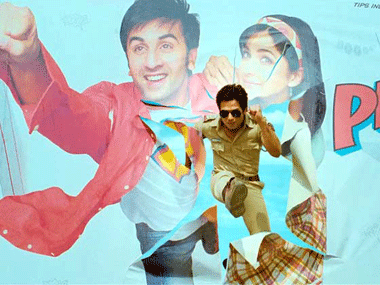The Rajkumar Santoshi genre of comedy is hard to translate. It’s some insane combination of silly slapstick and filmi spoof, via which we’re also meant to experience a return to a world of pure good and evil – a world which has only ever existed in Manmohan Desai movies. Pretty much every situation and character in Phata Poster Nikla Hero is a deliberate comic reworking of a ’70s’ Hindi movie cliché – the labouring single mother who raises her son to be an honest man, the loving son who can’t see tears in his mother’s eyes, the gang of villains who trick the hero into doing bad things on their behalf, and the evil supervillain who wants to destroy the world. But it is a gentle, goofy reworking that remains, in spirit, thoroughly inside the emotional universe of Hindi movie melodrama. [caption id=“attachment_1123117” align=“alignleft” width=“380”]  Courtesy: ibn live[/caption] The comic strip opening credits are the first of many similarities in tone with Santoshi’s last outing, Ajab Prem Ki Gazab Kahaani, but I enjoyed Phata Poster more. The film’s first half is giggly fun. Our hero gets a classic Hindi-pikchar childhood in a classic Hindi-pikchar gaaon. By having him leaf through a film magazine with black-and-white Dharmendra images in contrast to the present world of superstar Khans, Santoshi makes it quite clear that this film is making no concessions to realism. The moon-faced Padmini Kolhapure updates the old-style patthar-todne-wali maa with utter conviction, as an honest auto-driver who makes her little son Vishwas swear to lifelong incorruptibility. Post-credits, we meet the grown-up Vishwas (Shahid Kapoor). He’s a good guy, and he can even dispatch a bunch of baddies with several flying kicks, but what he really enjoys is the dialoguebaazi that comes with the action. Ergo, all he can think of is breaking into Bollywood, but his mother is set on him becoming an imaandaar police afsar. It’s this one-line premise that suffices as ‘plot’ in Phata Poster. Because of course this film is not about plot. It’s about timing. Barring Kolhapure, who does the difficult job of keeping a straight face in the midst of the madness, Santoshi’s brief to all his actors clearly was to enjoy themselves thoroughly. None more so than his hero. From leaping out of an Ajab Prem poster and handing over Ranbir Kapoor’s torn-out face to a girl just robbed of her dupatta, to scaring the hell out of a film director by playing the villain role he’s just been rejected for, Shahid Kapoor is a blast, and seems to be having one too. (I think my favourite bit of Shahid silliness is his dog-antics in the “Khali-pili” song, which I might vote for as most infectiously ridiculous dream sequence song in a while. Don’t judge me, people.) Santoshi’s brand of goofball humour, first established with the cult comedy Andaz Apna Apna (1994), spares us the gross toilet jokes that are all the rage at the box office. Instead of macho, sexist grotesquery, we get a frothy comic-book world, in which it seems reasonably appropriate that the ‘social worker’ heroine (Ileana D’Cruz) keeps popping up like a Jack-in-the-Box and is referred to by all and sundry as ‘Complaint Kajal’. Saurabh Shukla as mafia don Gundappa makes his entry by blowing a pink bubblegum balloon. When a sleazy director seems to be attempting to seduce a starlet, we are distracted from events that may be at hand by her being given the wonderfully retro name of Shabbo. If there’s a kind of hopeless humour about corruption – a weary Gundappa complains about how there was a time when cops were honest enough to do the work they were bribed to do – the world is still headed by an honest top cop (a rather good Darshan Jariwala). Santoshi’s most admirable skill is to be able to shift registers continually, from zany silliness to sentimental appeal, and back again. Mother serious in hospital? Sad. But doctor is called Vinod Khanna? Oh, how funny. And so on and on. Sadly, the film’s second half can’t sustain the tempo, and things begin to flatten out badly. The songs, which in the first half seemed like seamless segues between moments of narrative action, now appear like pointless interruptions that only stretch an already overlong second half. The sweetness and light of the first half turns a little too saccharine by the climax. But flawed as it is, if you’re having a depressingly real-world week, Phata Poster might just be the escapist remedy you need.
Santoshi’s most admirable skill is to be able to shift registers continually, from zany silliness to sentimental appeal, and back again.
Advertisement
End of Article


)
)
)
)
)
)
)
)
)



